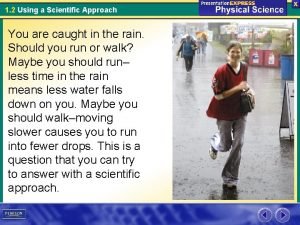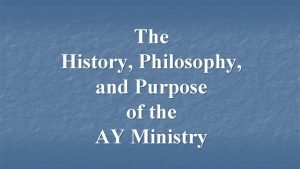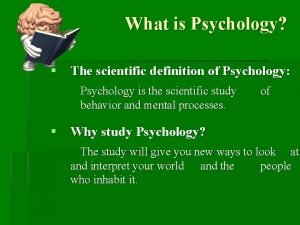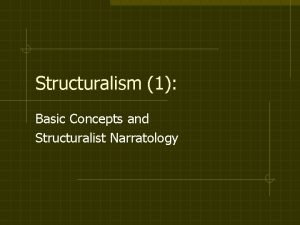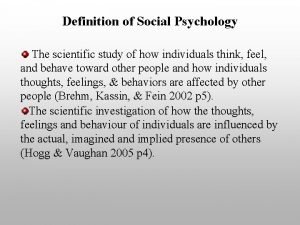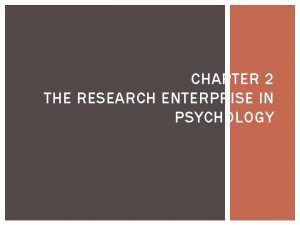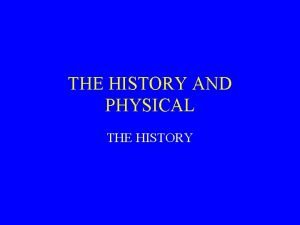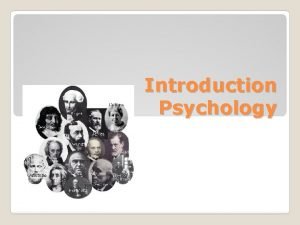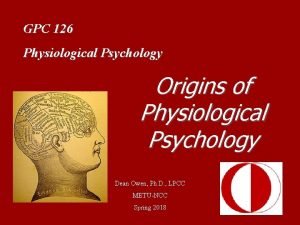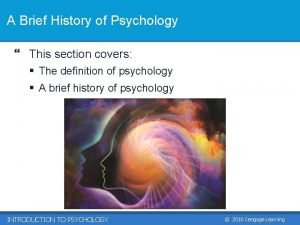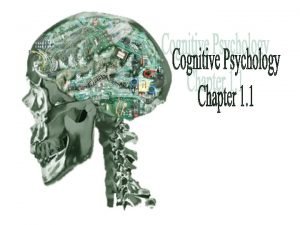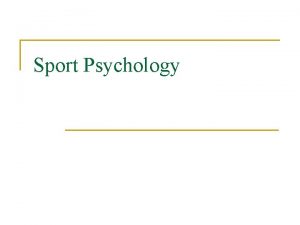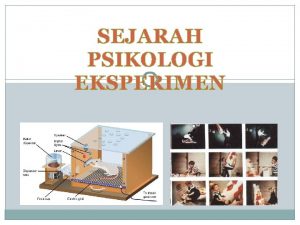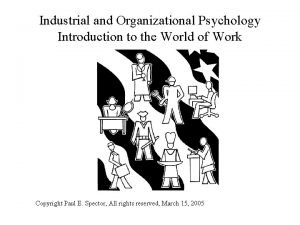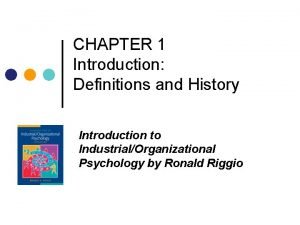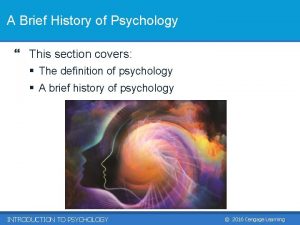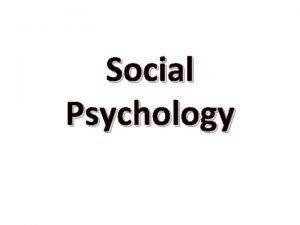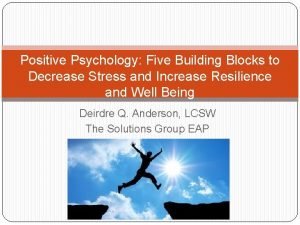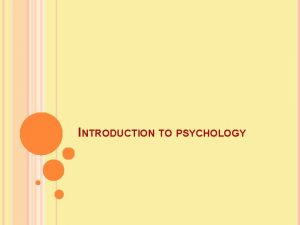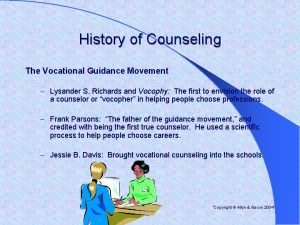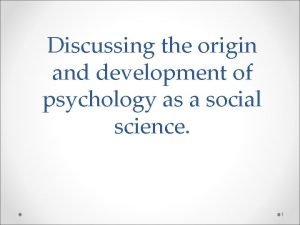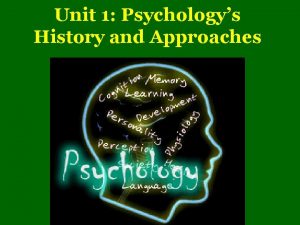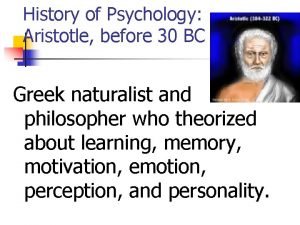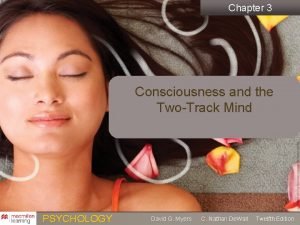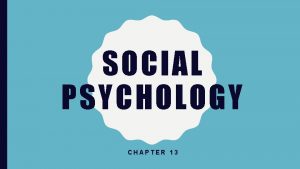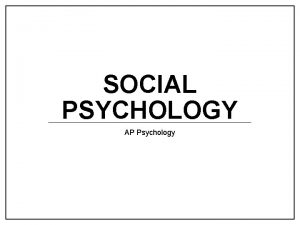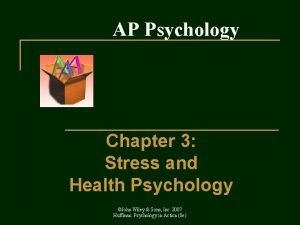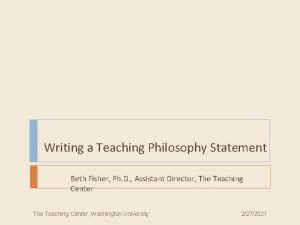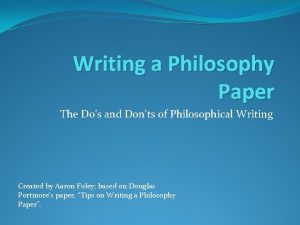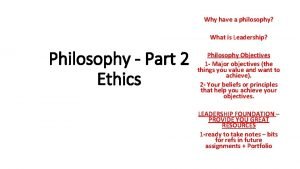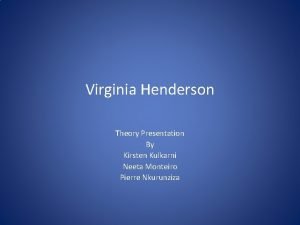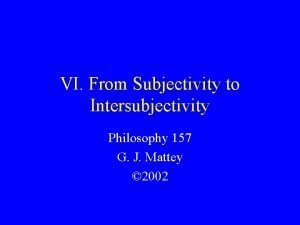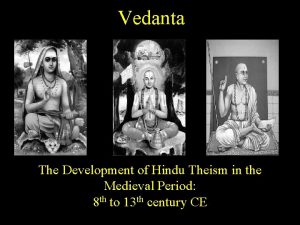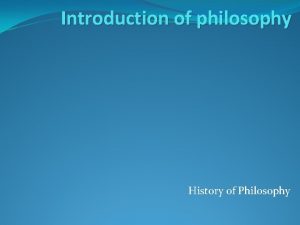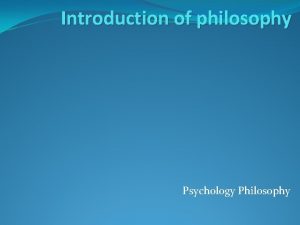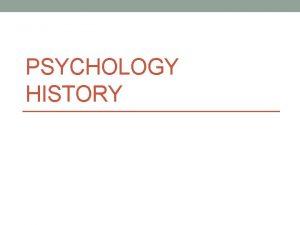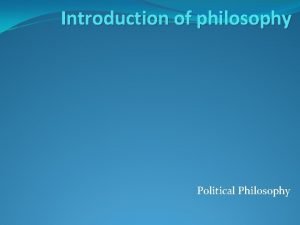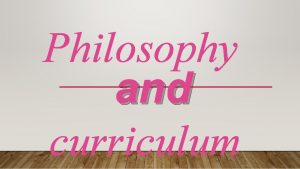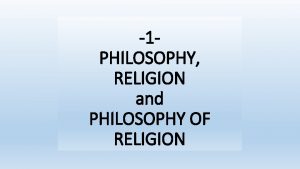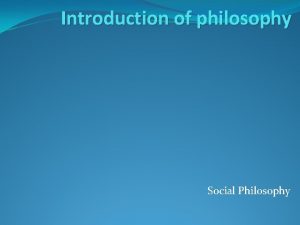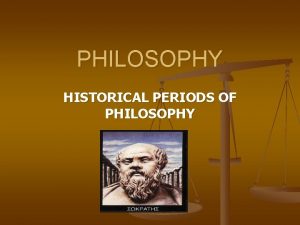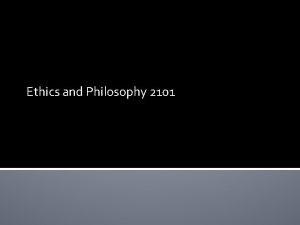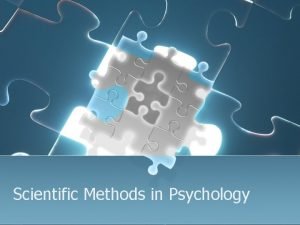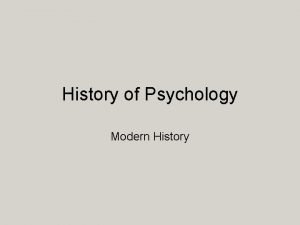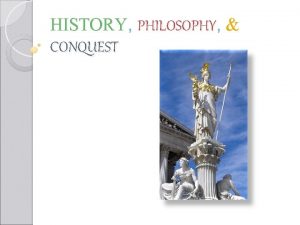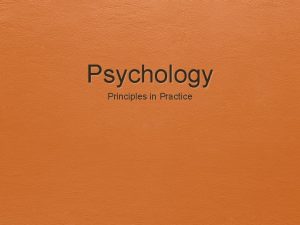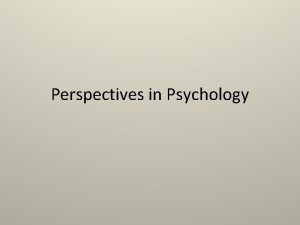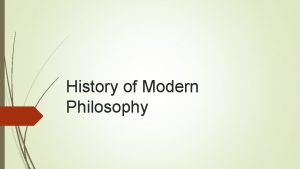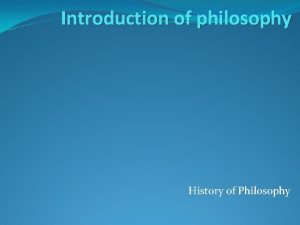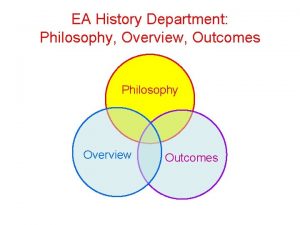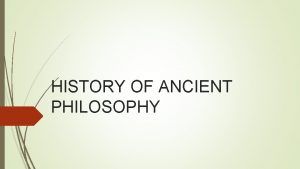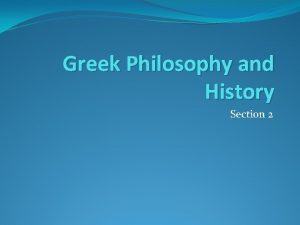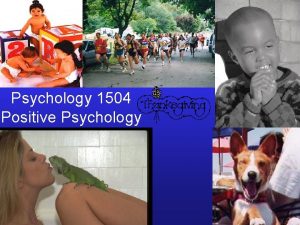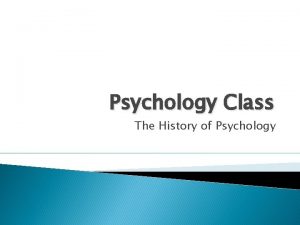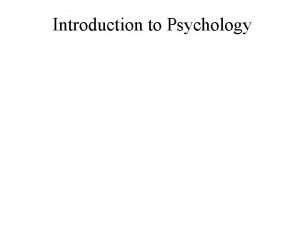HISTORY OF PSYCHOLOGY From philosophy to scientific psychology














































- Slides: 46

HISTORY OF PSYCHOLOGY From philosophy to scientific psychology

Outcome(s): Students will develop an understanding of the history of psychology an the topics covered

Agenda: 1. 2. 3. 4. Reading Schedules History of Psychology 3 Levels of Analysis Psychology of Everything

Course Overview Part 1: Core Part 2: Options Abnormal Psychology Developmental Psychology Part 3: Research Methodology Biological Level of Analysis Cognitive Level of Analysis Sociocultural Level of Analysis Methods Ethics Quantitative vs. qualitative Part 4: Experimental Study (IA)

Philosophy of the mind Psychology started as part of philosophy Literally, psychology means “reasoning about the soul” Epistemology (Greek – “episteme” knowledge and “logos” reasoning) Cognitive processes: When we ask questions about how humans know the world, we refer to processes such as sensation, perception, memory, language, and reason

Psychologists do study the strange and unusual, but they are interested in the normal and commonplace as well. Definition: psychology is the scientific study of behavior and mental processes Tools: scientific methods to study behavior Goals: describe, explain, predict, and control behavior IB Psychology Command Terms

Pseudoscience and Psychobabble Pseudoscience – fake/false science Psychic, Extrasensory Perception (ESP)

Activity #1 Examine the cards below, choose one. Once you have chosen, it is important that you concentrate on that card, for a minimum of 15 seconds.

Look carefully at the remaining cards, shown below. If I have been successful, you should find that your card is no longer present!

Gallop & Newport (1991) Survey 93% believed in at least one paranormal or psychic phenomenon 1/3 believed in reincarnation 1/3 believed in communication with the dead ½ believed that their dreams could predict events such as the death of a family member deja vu



History of Psychology

History of Psychology: Aristotle, before 30 BC Greek naturalist and philosopher who theorized about learning, memory, motivation, emotion, perception, and personality.

René Descartes: 1596 -1650 Originated the concept of Dualism, viewed mind and body as interactive machines. Stated that the mind could follow body and vice versa. Proposed the idea of both voluntary and involuntary behavior. Ruled out areas other than the brain for mental functioning.

John Locke: 1632 -1704 Knowledge should be acquired by careful observation. No innate ideas: all knowledge comes from experience or reflection. Mind is a blank slate written on by experience (tabula rasa).

Charles Darwin: 1850 s Studied the evolution of finches and expands his study to include humans. Opposed religious teachings of the time by suggesting that man was a common ancestor to lower species.

Birth of Psychology Wilhelm Wundt: Father of Psychology 1879: Leipzig, Germany. Intended to make psychology a reputable science. Many American psychologists eventually went on to study in Leipzeig.

Wilhelm Wundt: Father of Psychology Most of his experiments on sensation and perception. Did not think that high order mental processes could be studied experimentally. Trained in medicine and philosophy. Wrote many books about psychology, philosophy, ethics, and logic.

Can you read this? This is bcuseae the huammn mnid deos not raed ervey lteter by istlef, but the word as a wlohe. Amzanig, huh?

Introspection Looking inward at one’s own mental processes. Because it is not objective, it fails miserably.

E. B. Titchener Wundt’s student. Taught at Cornell University. Studied nature of mental experiences. Structuralism: Analyze sensations, images and feelings into their most basic elements.

William James: 1842 -1910 Claimed that searching for building blocks was a waste of time because brain and mind are constantly changing: focused on function. Functionalism. Underlying causes and practical consequences of certain behaviors and mental strategies: “Stream of Consciousness. ” Expanded psychology to animal behavior.

Herman Ebbinghaus 1885 Published classic studies on memory, nonsense syllables, learning curve.

American Psychological Association (APA) Founded in 1892: the governing body of all research not conducted by universities. APA & Ethics

G. Stanley Hall First president of the APA, established the first psychological lab in the U. S. in 1883, at Johns Hopkins University. Started the American Psychological Journal (1887) now the American Journal of Psychology.

Eclecticism Utilizing of diverse theories and schools of thought. Mosaic, no single approach can create the whole picture. Unlikely for psychology to ever have a unifying paradigm. Grand theories replaced by more specific ones.

Present Day Psychology Behavioristic theory: Expanded psychology into many groups that could not be studied by introspection. All behavior is observable and measurable. Abandoned mentalism for behaviorism.

Behaviorism Ivan Pavlov, 1849 -1936. Russian experimenter who showed automatic/involuntary behavior in learned responses to specific stimuli in the environment. Created “Classical Conditioning. ”

Behaviorism John Watson, 1913. Psychology can never be as objective as chemistry or biology. Consciousness is not that easy. “I can take a child and make him into anything, a beggar, a doctor, a thief. ”

Behaviorism B. F. Skinner, 1950’s. Dismissed importance of inherited traits and instincts about human behavior. Private events can be studied as long as they are treated as a form of behavior, many experiments with learning and memory. Believed that all behavior is a result of rewards and punishments in the past.

Behavioristic Theory Social Learning Theory: How people acquire new behaviors by observing and imitating others (modeling). Criticisms: Excluded all behavior that cannot be seen. All behavior cannot be explained by rewards and punishments. Treats people like robots as if they have no free-will.

Psychoanalytic Theory All behavior is meaningful, and much of it is controlled by digging below the surface to uncover the roots of personality. Sigmund Freud!!! (Da MAN!)

Psychoanalytic Theory Sigmund Freud, 1856 -1939. Studied neurology, but wanted to be a medical researcher, forced into being a private physician. Became convinced that patients difficulties were due to mental rather than physical problems. Proposed that distress due to problems that dated back to childhood.


Siggy Freud Psychoanalysis: Freud’s method for treating people with emotional problems, free association. Unconscious: Nearly all of our impulses are sexual and aggressive in nature. Because we cannot accept them in our conscious, thoughts find their expression in dreams, slips of the tongue that appear as accidents, and even jokes.

Biological Seeks to understand the nervous system. All actions, feelings associated with the nervous system. Wilhelm Wundt: Expected psychology to rest almost solely on Anatomy and Biology. Interested in how bodily events interact with events in the external environment to produce perceptions, memory and behavior. Roger Sperry won Nobel. Prize for his Split-Brain research.

Biological Nervous System: Responsible for our behavior; Specifically abnormal and immediate responses. Anatomy/Biology: Solely responsible for human behavior. Criticisms: Ignores mental processes. Explains too little of human behavior, rejects environmental influences.

Cognitive Theory Thinking: how mental thoughts affect behavior. Humanism gives rise to the Cognitive Theory. Studies how we attend, perceive, think, remember, solve problems and arrive at beliefs. Know what’s going on in people’s heads first, then applies it to their behavior. Jean Piaget: studies children’s cognitive development.

Cognitive Theory Thought Processes: Can infer mental processes from observable behavior. Gestalt Psychology: means “pattern” or “configuration. ” Studies how people interpret sensory information in order to acquire knowledge. “The whole is larger than the sum of its parts”

Cognitive Theory: Criticisms Downplays emotion, too mentalistic, hard to decide between competing cognitive explanations. Strong approach today. Birth of cognitive psychology often dated to George Miller’s (1956) “The Magical Number 7 Plus or Minus 2”

Sociocultural Psychology Sociocultural theory grew from the work of psychologist Lev Vygotsky, who believed that parents, caregivers, and peers and the culture at large were responsible for the development of higher order functions Examines how cultural and political (religious) experience effect our everyday life. Gender influences of behavior. Job opportunities to influence people’s goals and ambitions.

Sociocultural Psychology It is NOT intrapsychic: Within the mind or self. Cultural Values/Political Systems: How norms and social influences affect behavior.

Sociocultural Psychology Ambition/Goals/Values: Environments influence on one’s long-term ambitions. Criticisms: Underestimated personal and overestimated social influences on our behavior. Makes broad generalizations about ethnic groups and cultures.

Psychologists Video Clips Shark Shrunk Psychologists

Psychologists Today
 Information gathered during an experiment
Information gathered during an experiment How is a scientific law different from a scientific theory?
How is a scientific law different from a scientific theory? Norm middag
Norm middag The belgrade charter
The belgrade charter Psychology has its roots in philosophy
Psychology has its roots in philosophy Scientific revolution ap world history
Scientific revolution ap world history History of the scientific method
History of the scientific method Evolutionary perspective of psychology
Evolutionary perspective of psychology Structuralism in linguistics
Structuralism in linguistics Social psychology definition psychology
Social psychology definition psychology Vce psychology scientific poster
Vce psychology scientific poster Chapter 2 the research enterprise in psychology
Chapter 2 the research enterprise in psychology Also history physical
Also history physical History of developmental ideas in psychology
History of developmental ideas in psychology Scientists have to
Scientists have to History of cognitive psychology
History of cognitive psychology Georgia court competency test
Georgia court competency test History of cognitive psychology
History of cognitive psychology A brief history of psychology
A brief history of psychology History of cognitive psychology
History of cognitive psychology Sport psychology history
Sport psychology history Sejarah perkembangan psikologi eksperimen
Sejarah perkembangan psikologi eksperimen Timeline of the history of i/o psychology
Timeline of the history of i/o psychology History of forensic psychology
History of forensic psychology History of organizational psychology
History of organizational psychology Brief history of psychology
Brief history of psychology Social psychology
Social psychology Definition of psychology
Definition of psychology Scope of positive psychology
Scope of positive psychology Scope of clinical psychology
Scope of clinical psychology History of forensic psychology
History of forensic psychology Eli weaver counseling
Eli weaver counseling Structuralist school of thought
Structuralist school of thought The 7 approaches to psychology
The 7 approaches to psychology Greek history of psychology
Greek history of psychology What is the place of consciousness in psychology's history
What is the place of consciousness in psychology's history Positive psychology ap psychology definition
Positive psychology ap psychology definition Two factor theory psychology
Two factor theory psychology Fundamental attribution error ap psychology
Fundamental attribution error ap psychology Health psychology definition ap psychology
Health psychology definition ap psychology Zaha hadid philosophy
Zaha hadid philosophy Sample philosophy of teaching
Sample philosophy of teaching Transition words for philosophy papers
Transition words for philosophy papers Definite dozen
Definite dozen Virginia henderson's theory
Virginia henderson's theory Intersubjectivity in philosophy
Intersubjectivity in philosophy Advaita vedanta
Advaita vedanta

